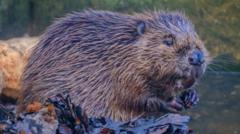Will the New Beaver Viewing Centre Boost Wildlife Tourism?

Published: 2025-10-31 11:00:15 | Category: wales
The plans to build a beaver observatory at Cors Dyfi Nature Reserve in Wales have been confirmed following the species being granted protected status. The initiative, spearheaded by Montgomeryshire Wildlife Trust (MWT), aims to enhance public engagement with the reintroduced beaver population, which has been making a comeback in the region after centuries of extinction due to over-hunting.
Last updated: 05 October 2023 (BST)
What’s happening now
Following confirmation from the Welsh government that beavers will be legally protected as a native species, Powys council has approved the construction of a beaver observatory at Cors Dyfi Nature Reserve. This development is significant, as it not only reinforces the conservation efforts surrounding beavers but also aims to increase public awareness of their ecological importance. The observatory will include an elevated building with solar panels and a boardwalk for easy access, allowing visitors to observe beaver behaviour in their natural habitat.
Key takeaways
- Beavers have been granted protected status under Welsh law.
- The observatory at Cors Dyfi will include a feeding station and boardwalk access.
- Beavers are considered a "keystone species" vital for ecosystem management.
Timeline: how we got here
Understanding the chronology of beaver reintroduction and conservation in Wales provides context for this recent development:
- Early 1600s: Beavers became extinct in the wild across Britain due to over-hunting.
- Late 20th century: Beavers re-emerge in fenced enclosures and through unlicensed releases in Wales.
- October 2023: Welsh government confirms beavers as a protected native species.
- October 2023: Powys council approves the beaver observatory at Cors Dyfi Nature Reserve.
What’s new vs what’s known
New today/this week
The recent decision by the Welsh government to grant protected status to beavers marks a significant shift in wildlife conservation policy. This new status allows for better management and potential reintroduction efforts across Wales, particularly in areas where beavers have already established presence.
What was already established
Beavers were historically present in the UK but were hunted to extinction. Recent decades have seen a small population of beavers re-establishing in the wild, primarily in fenced reserves, leading to a growing recognition of their ecological role as a keystone species. Conservationists have long advocated for their formal reintroduction to aid in biodiversity and ecosystem health.
Impact for the UK
Consumers and households
The construction of the observatory and the presence of beavers may increase ecotourism opportunities in the area. This could provide local economic benefits while also raising awareness about conservation efforts and the importance of biodiversity. Additionally, beavers contribute positively to water management, which may improve local agriculture and recreational opportunities.
Businesses and jobs
Local businesses may benefit from increased visitor numbers due to the observatory and conservation initiatives. As ecotourism grows, job opportunities in hospitality, guiding services, and conservation education could also emerge. Furthermore, businesses involved in environmental restoration and wildlife management may see increased support and funding.
Policy and regulation
The change in beaver status under Welsh law aligns with broader conservation strategies across the UK. Upcoming consultations and discussions may centre on the implications for land management practices, especially in flood-prone areas. The success of this initiative could also influence similar policies in England and Scotland.
Numbers that matter
- £50,000: Estimated cost of constructing the beaver observatory.
- 3: Number of beaver sites currently operating in Wales.
- 16th Century: The time when beavers were last seen in the wild in Britain until their recent re-emergence.
- 1: The number of native species classifications that beavers now hold under Welsh law.
- 2: Countries in the UK (England and Scotland) that have implemented formal reintroduction strategies for beavers.
Definitions and jargon buster
- Keystone species: A species that has a disproportionately large effect on its environment relative to its abundance.
- Ecotourism: Responsible travel to natural areas that conserves the environment and improves the well-being of local people.
- Natural Resources Wales (NRW): The body responsible for managing Wales’ natural resources, including wildlife conservation.
How to think about the next steps
Near term (0–4 weeks)
In the immediate future, construction of the beaver observatory is expected to begin, with regular updates from MWT on progress and engagement opportunities for the public to learn about beavers.
Medium term (1–6 months)
As the observatory nears completion, MWT will likely conduct outreach efforts to educate the public on the ecological benefits of beavers and the importance of protecting biodiversity in Wales.
Signals to watch
- Monitoring reports from MWT on beaver activity and ecosystem changes at Cors Dyfi.
- Updates from the Welsh government regarding further policies on wildlife conservation and reintroduction efforts.
- Visitor engagement numbers and feedback on the new observatory.
Practical guidance
Do
- Participate in local conservation initiatives and educational programmes.
- Visit the observatory and support ecotourism in the region.
- Stay informed about wildlife conservation policies in Wales.
Don’t
- Disregard the ecological impact of beavers; they play a crucial role in habitat management.
- Engage in illegal wildlife releases; follow guidelines set by conservation authorities.
- Neglect to report any concerns regarding wildlife habitats or behaviours to relevant authorities.
Checklist
- Follow developments on the beaver observatory project.
- Understand the ecological significance of beavers in local ecosystems.
- Participate in or support local wildlife conservation efforts.
- Stay updated on regulations regarding wildlife protection in Wales.
- Engage with community events focused on biodiversity and conservation.
Risks, caveats, and uncertainties
While the reintroduction of beavers presents numerous ecological benefits, there are potential risks such as flooding in certain areas and conflicts with agricultural practices. These issues will need careful management and monitoring. Furthermore, the long-term success of beaver populations in the wild will depend on continuous support from local communities and effective policy implementation.
Bottom line
The approval of the beaver observatory at Cors Dyfi Nature Reserve marks a pivotal moment for wildlife conservation in Wales. As beavers gain protected status, this initiative could pave the way for broader efforts to restore their populations in the wild, enhancing biodiversity and ecosystem health across the region.
FAQs
Why are beavers considered a "keystone species"?
Beavers are termed a "keystone species" because their activities significantly influence their ecosystem, including water management and habitat creation for other species.
What will the beaver observatory entail?
The beaver observatory will feature an elevated building, boardwalk access, and a feeding station, designed for public observation of beavers in their natural habitat.
How does the protected status of beavers affect conservation efforts?
The protected status allows for better management of beaver populations and supports formal reintroduction strategies, enhancing biodiversity and ecosystem restoration efforts.



